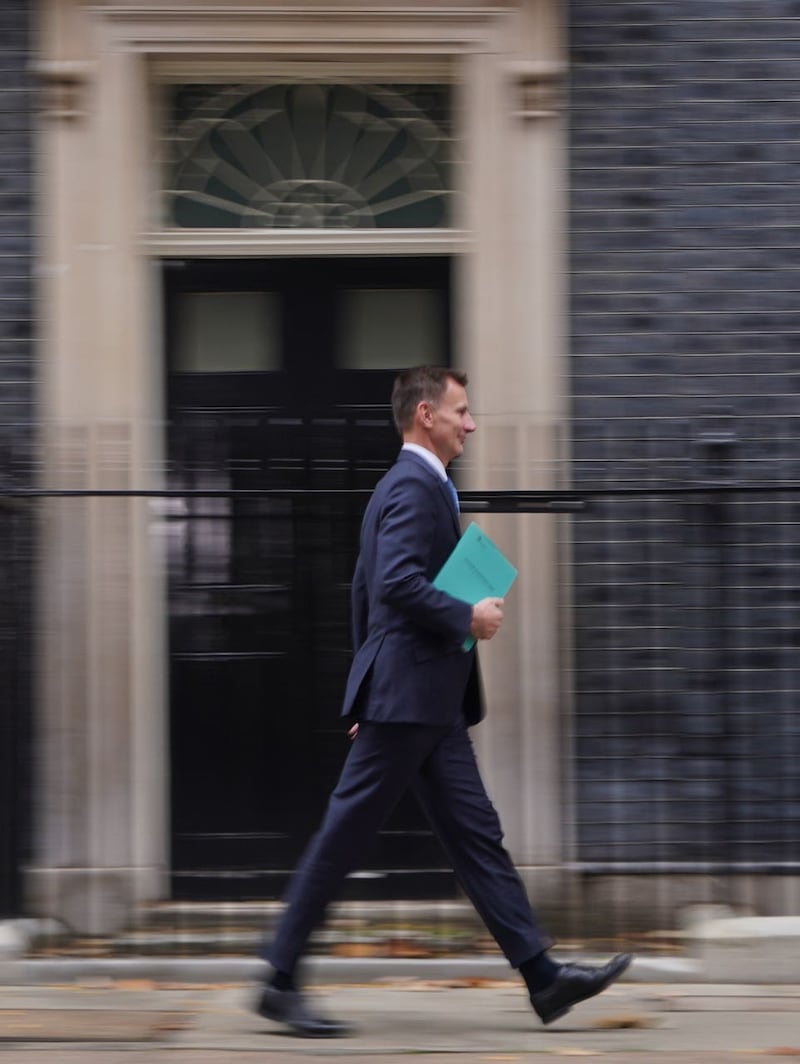Government departments are set to face a major spending squeeze in the coming years, with pressure to cut budgets likely to bite after the next general election.
Jeremy Hunt’s autumn statement offered little extra support to struggling departments, which have seen real spending eroded by higher inflation. It will mean cuts in the years to come that some economists have labelled “implausibly large” and potentially “undeliverable”.
The autumn statement saw the Chancellor celebrate a 2p cut in national insurance, but the move makes finding savings from within department budgets more difficult and a major headache for the next government.
Higher inflation means the real value will be over £19 billion lower by 2027/28 compared to March forecasts. That is despite an increase of £4.1 billion a year on average in the autumn statement, spending watchdog the Office for Budget Responsibility (OBR) said.
The Treasury argues total departmental spending will be £85 billion higher in real terms by the end of next parliament, compared to start of this parliament.
But influential think tank the Institute for Fiscal Studies said while higher inflation had pushed up tax revenue, department budgets do not automatically adjust.
Director Paul Johnson said: “These tax cuts have been ‘paid for’, in effect, by a bigger squeeze on the real-terms value of public service budgets and an even bigger squeeze on public investment, which is frozen in cash terms.
“There’s a material risk that those plans prove undeliverable and today’s tax cuts will not prove to be sustainable.”
There is limited detail about how savings will be achieved in the next departmental spending review, but the Treasury has indicated there will be plans to improve productivity.
It remains to be seen how much belt-tightening can be achieved in already under-pressure departments, with the OBR warning that on previous occasions governments have topped up funding by significant amounts as spending reviews have approached.
“The outlook for departmental spending is therefore a significant and growing risk to our forecast,” the watchdog says.
The Chancellor’s autumn statement also raises questions about ministers’ ambition to eventually raise defence spending to 2.5% of GDP, something Prime Minister Rishi Sunak has said will happen when economic circumstances allow.
While that position is not believed to have changed, the OBR warns going above the current Nato minimum of 2% would “increase the pressure on unprotected spending”.

The spending watchdog also notes that a return to the target of spending 0.7% of national income on overseas aid, after the budget was cut to 0.5% by Mr Sunak as chancellor in 2021, would cost £6.3 billion if met in 2028/29.
“Sticking to the Government’s stated departmental spending plans has also become more difficult in the face of more persistent inflation and new long-term commitments such as the NHS workforce plan,” OBR chair Richard Hughes said.
“Just preserving the real spending power that departments had in March would require an additional £19 billion by 2027/28.”
The Resolution Foundation warned that under current plans, unprotected departments, such as prisons and local government, are facing cuts of almost 9% in day-to-day spending between 2024/25 and 2028/29.
The think tank called the scale of the cuts “implausibly large”.
Its chief executive Torsten Bell said: “The giveaways announced today are funded by handing whoever wins the next election implausibly large spending cuts.
“Tax cuts to boost business investment are welcome, but undermined by plans to cut public investment by over a third – it’s hard to think of a more anti-growth policy.”
Trade union Unite said that the autumn statement “starves public services”, with general secretary Sharon Graham promising to “press for action” on funding.
NHs Providers also expressed concern, with chief executive Sir Julian Hartley warning that “increasing productivity can’t be a case of just asking already overstretched staff to do more with existing resources”.
“If ministers want to see waiting times come down – a stated government priority – and productivity go up then hospital, mental health, community and ambulance services need significant capital injections to repair buildings and facilities and for digital transformation,” he said.








